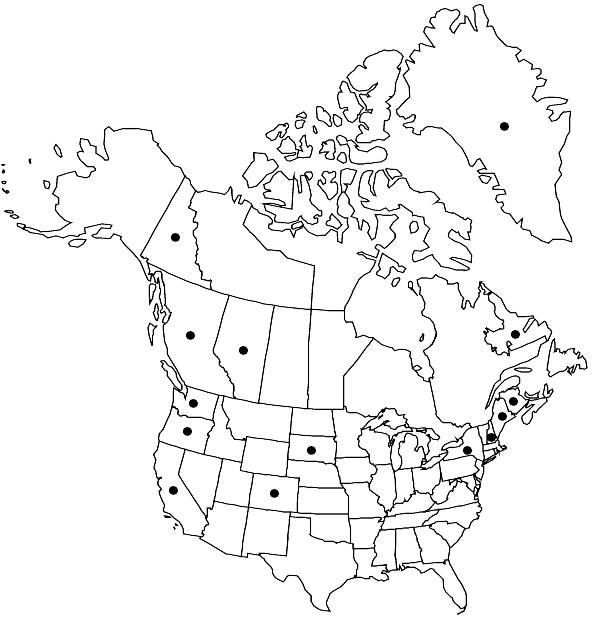Difference between revisions of "Grimmia incurva"
Sp. Musc. Frond. Suppl. 1(1): 90. 1811,.
FNA>Volume Importer |
imported>Volume Importer |
||
| Line 51: | Line 51: | ||
|publication year= | |publication year= | ||
|special status= | |special status= | ||
| − | |source xml=https:// | + | |source xml=https://bibilujan@bitbucket.org/aafc-mbb/fna-data-curation.git/src/bb6b7e3a7de7d3b7888a1ad48c7fd8f5c722d8d6/coarse_grained_fna_xml/V27/V27_347.xml |
|subfamily=Grimmiaceae subfam. Grimmioideae | |subfamily=Grimmiaceae subfam. Grimmioideae | ||
|genus=Grimmia | |genus=Grimmia | ||
Revision as of 22:31, 27 May 2020
Plants in usually rounded cushions, green to blackish. Stems 1–2 cm, central strand present. Leaves incurved and moderately contorted when dry, spreading when moist, oblong- to linear-lanceolate, tapering to a slender and acuminate, often hyaline apex, 2.5–4.5 × 0.3–0.5 mm. keeled, margins plane or recurved proximally on one or both sides, awns short, often only mucronate, occasionally long and denticulate, costa projecting on abaxial side; basal juxtacostal laminal cells long-rectangular, slightly sinuose, thick-walled; basal marginal laminal cells short- to long-rectangular, thin-walled; medial laminal cells rectangular, nodulose, thick-walled; distal laminal cells 1-stratose, margins and apex 2-stratose. Gemmae absent. Sexual condition dioicous. Seta arcuate, 1.5–2 mm. Capsule occasionally present, emergent to exserted, yellowish, obloid, smooth or somewhat wrinkled when dry, exothecial cells thin-walled, annulus present, operculum conic to rostrate, peristome teeth orange, divided distally, papillose. Calyptra mitrate.
Habitat: Shaded damp, acidic rock
Elevation: moderate to high elevations (500-2500 m)
Distribution

Greenland, Alta., B.C., N.B., Nfld. and Labr. (Labr.), Yukon, Calif., Colo., Maine, N.H., N.Y., Oreg., S.Dak., Wash., Eurasia.
Discussion
The peculiar east-west disjunct distribution of Grimmia incurva in North America may reflect its preference for damp sites. Specimens have been collected in New England and in the Maritime Provinces, with a second widespread area running from the Yukon south through to California. It is uncommon in the continental interior. Grimmia incurva is a shade-loving subalpine species, characterized by rounded dark green cushions and linear, contorted leaves. The awns are visible only with a hand-lens. This species has a habit more like that of Dicranowesia crispula than of a Grimmia. H. A. Crum and L. E. Anderson (1981) reported immersed capsules, but that is not correct; they are clearly exserted (H. C. Greven 1995). Crum and Anderson also observed: “Specimens recorded from Maine can be considered a shade form of G. donniana.” However, this confusion extends beyond Maine. Greven renamed nearly all the G. donniana specimens from New York and New Hampshire in MICH to G. incurva. Hastings agrees that these specimens cannot be G. donniana because the leaf shape is virtually identical to that of G. incurva, being narrowly lanceolate and contorted. However, like G. donniana, and unlike G. incurva, the specimens are autoicous and the setae are straight. Rather than expanding the concept of either G. donniana or G. incurva to include these anomalous specimens, we propose that they represent an as yet unpublished species with a unique combination of characters. Hastings thus retains G. incurva as being dioicous and G. donniana as having oblong-lanceolate leaves.
Selected References
None.